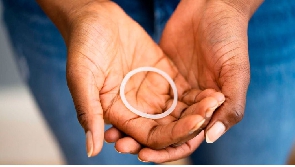 A woman holds a diaphragm vaginal contraceptive ring
A woman holds a diaphragm vaginal contraceptive ring
A long-term HIV prevention method for women has been approved for pilot use in Kenya for the first time.
According to the Population Council, dapivirine vaginal ring has also been cleared for pilot use in Eswatini, Lesotho, South Africa, Uganda and Zimbabwe.
The ring is made of flexible silicone and slowly releases the anti-retroviral drug dapivirine in the vagina over a one-month period, as opposed to the daily pills.
In a move that will see women protect themselves discreetly and on their own terms from HIV infection, the council has also signed a memorandum of understanding with Kiara Health, an African-based pharmaceutical manufacturing and healthcare solutions company.
The company has received a licence to locally manufacture and sell the ring in order to lower the cost of the product and improve access.
The announcement comes at a time when, according to the Kenya Demographic Health Survey (KDHS) report, a higher proportion of men (15 percent) than women (four percent) reported having two or more sexual partners. Of those with more than one partner, fewer women compared to men reported using a condom.
The KDHS also reported that a woman has an average of between two and three sexual partners and men seven.
Jim Sailer, the council’s interim co-president, said HIV/Aids remains the biggest health threat to women and that they deserve to protect themselves from it.
“Women bear the brunt of the HIV/Aids epidemic,” said Sailer.
“The virus is one of the biggest threats to the health and well-being of women. In Sub-Saharan Africa, one adolescent girl or young woman becomes infected with HIV every three minutes.”
“We cannot achieve the Sustainable Development Goal (SDG) of ending HIV by 2030 unless we curtail this epidemic in women. Women deserve multiple options to protect themselves against this lifelong disease,” he added.
The ring, said Anita Bhatia Garg, senior director for strategy and commercial relations at the council, provides an option for women who have challenges in taking PrEP—the daily HIV prevention pills. She has been involved in the ring’s development for more than 15 years.
“Women have told us they want more options in the future, and we’re responding,” said Ms Garg. “Women need different choices for HIV prevention at different stages of their lives, and the ring could be a critically important option.
“It complements existing HIV prevention tools and circumvents well-documented challenges that adolescent girls and young women face in taking pills on a daily basis.”
Diantha Pillay, associate director for product access for the council’s South African affiliate office, stated that the ring will allow women control over their sexual health, especially in relationships where they undergo gender-based violence and are unable to negotiate for safe sex.
“Due to economic disparities and uneven power dynamics within sexual partnerships, women and girls are often unable to negotiate safer sex or even choose when or with whom they have sex,” said ms Pillay. “These factors also drive gender-based violence, which further increases women’s risk of HIV infection.”
Currently, the ring can only be used for one month and is produced by SPS Pharma in Sweden. However, the Population Council is developing a three-month dapivirine ring to lower annual costs and offer women a more convenient option to protect themselves.
Once the ring is ready and submitted for regulatory approval in the next 12-18 months, Kiara Health will oversee its access before it begins manufacturing. During this period, the company will receive grant funding and technical assistance for the technology transfer, regulatory certification, including WHO pre-qualification, marketing and distribution operations, and capacity building.